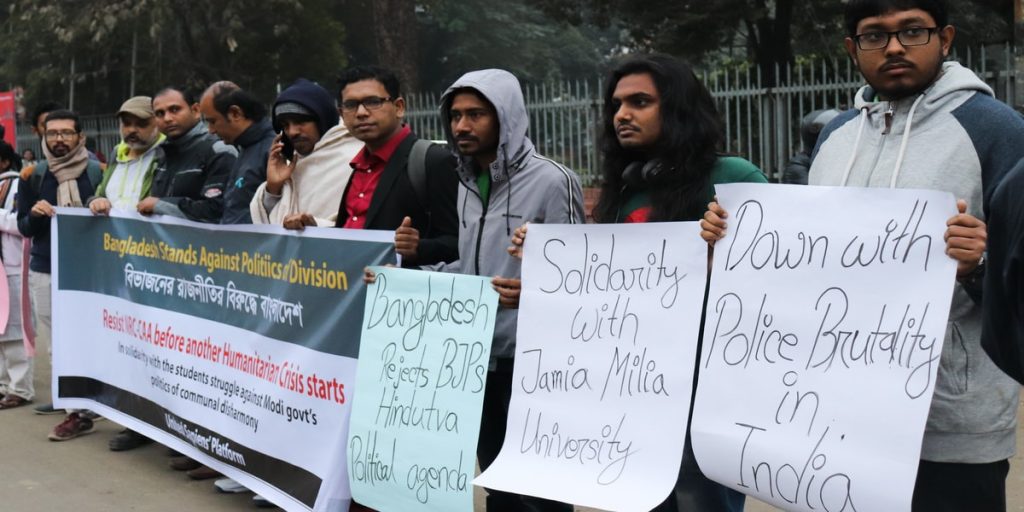At 4 pm on Thursday, 19th December 2019, Dhaka’s United Sapiens’ Platform organized an assembly in front of the National Museum, addressing the atrocious and overtly racist National Registration of Citizens (NRC) and Citizenship Amendment Act (CAA) being enacted by the government of neighboring country India. The assembly protested both steps and expressed solidarity with protesters in India. It also criticized the attacks on protests organized by Bangladesh Student Rights Preservation Council and demanded that the attackers be brought to justice. It also presented a five-point list of demands.
The assembly was attended by professors of the Dhaka University, lawyers of the Supreme Court, writers, journalists, representatives of the Citizen’s Council and Independence Activists. Representatives from Bangladesh Sadharon Chhatro Odhikar Songrokkhon Parishad (বাংলাদেশ ছাত্র ইউনিয়ন), Bangladesh Student Federation (বাংলাদেশ ছাত্র ফেডারেশন), Gonosamhati Andolan (গণসংহতি আন্দোলন), Moulik Bangla (মৌলিক বাংলা), Gonotantrik Somabesh (গণতান্ত্রিক সমাবেশ), Bangladesh Punorgothon Prakria (বাংলাদেশ পুনর্গঠন প্রক্রিয়া), Rashtrochinta (রাষ্ট্রচিন্তা), and Muktiforum (মুক্তিফোরাম) were present in solidarity.
The speakers at the assembly stated that Bangladesh’s Independence War is incongruent with the ideals of CAA/NRC, and the war did not happen to uphold the doctrine of India’s BJP.
The speakers also outlined some of the issues with NRC and CAA: firstly, NRC and CAA are highly xenophobic and divisive and legalizes some extreme views of Hindu nationalists, and promotes ethnocentrism rather than pluralism. Secondly, these acts directly oppose the secular ideals of Bangladesh’s independence.
Thirdly, Bangladesh and Bangladeshis were targeted in these Hindu nationalist statements and acts. Finally, these acts by India might culminate in a xenophobic outburst against minorities in Bangladesh. The Hindu Nationalist statements were tailored to make minorities in neighboring countries more vulnerable.
The speakers in the United Sapiens’ Platform believe that historically the politics within the subcontinent is deeply intertwined. In the past, attacks on the minority population in India has also triggered violence against minorities in Bangladesh, where the majority-minority makeup is switched. The demolition of Babri Masjid in 1992 also lead to communal violence in Bangladesh. Therefore, the result of these acts can be devastating. Reports of some backlash have already started pouring in (for example, there have already been some incidences of push-in from India to Bangladesh).
The long-term widespread institutionalization of religious majority ideologies cannot yield positive results for an independent Bangladesh or the subcontinent as a whole. Bangladeshi citizens who support the ideals of the Independence War should all oppose these draconian acts, show solidarity with those who are protesting and criticize those who attacked the protesters. These are the lessons of the Independence War.
Some speakers at the assembly noted that the Government of Bangladesh has skirted around this issue by saying this is India’s internal affair and will not have any impact on Bangladesh. Moreover, the government has encouraged attacks on the protesters who have been opposing CAA and NRC on the grounds of far-reaching negative consequences of these acts as well as on humanitarian grounds.
The promise and pledge of the Independence War is a multicultural society. In the month of Victory, the United Sapiens’ Platform invoked this pledge and presented the following demands:
- The Government of Bangladesh must protest the NRC and CAA, which are designed to wrest away the citizenships of Indian Muslims.
- Bangladeshi Government should take a strong position against push-in, which is carried out by violating human and citizen rights. For those citizens who have already been pushed-in, the Bangladeshi Government should take action through International law.
- The Government should strongly criticize the portrayal of Bangladesh as a fanatical nation in the NRC and CAA laws.
- The Government should release a briefing stating that the NRC and CAA will lead to another crisis like the Rohingya situation. It is a step towards creating another refugee crisis through institutional persecution and/or genocide.
- The government should vocally express solidarity towards Indian students who are protesting these laws, and restate their commitment towards multiculturalism in South Asia.
A partial list of representatives from different organizations who were present to express solidarity is published below:
Akhtar Hossain – Social Services Secretary, DUCSU (সমাজসেবা সম্পাদক, ডাকসু)
Jahid Jamil – Bangladesh Students Union (বাংলাদেশ ছাত্র ইউনিয়ন)
Professor Rushad Faridi – Professor, Department of Economics, DU (শিক্ষক, অর্থনীতি বিভাগ, ঢাবি)
Julahasnain Babu – Ganasamhati Andolan (গণসংহতি আন্দোলন)
Armanul Haque – Bangladesh Student Federation (ছাত্র ফেডারেশন)
Mohammad Tareq Rahman – BSCASP (বাংলাদেশ সাধারণ ছাত্র অধিকার সংরক্ষণ পরিষদ)
Nayan Ahmed – Gonotantrik Samabesh (গণতান্ত্রিক সমাবেশ)
Taslima Akhtar – Ganasamhati Andolan (গণসংহতি আন্দোলন)
Sadiq Reza – Bangladesh Student Federation (ছাত্র ফেডারেশন)
Tawfiq Hassan – Bangladesh Student Federation (ছাত্র ফেডারেশন)
Armanul Haque – Bangladesh Student Federation (ছাত্র ফেডারেশন)
Shashan Thakur – Moulik Bangla (মৌলিক বাংলা)
Swapnil Chowdhury – Lokayata Bidyalay (লোকায়ত বিদ্যালয়)
Hasibul Hasan Shant-Lokayata Bidyalay (লোকায়ত বিদ্যালয়)
Naim Sinha – Activist
Rifat Bin Salam Rupom – Activist
Sakhawat Hossain – BPP (বাংলাদেশ পুর্নগঠন প্রক্রিয়া)
Md. A: Razzak Talukder Sajib,-BPP (বাংলাদেশ পুর্নগঠন প্রক্রিয়া)
Mizanur Rahman – Activist
Hanif Bangladeshi – Activist
Arman Hossain – Activist
Naeem Sinha- Activist
Rifat bin Salam Rupam – Activist
Abdur Razzak – Activist
Humayun Kabir – Activist
Advocate Hasanat Qayyum- Rashtrochinta (রাষ্ট্রচিন্তা)
Habibur Rahman Raja – Rashtrochinta (রাষ্ট্রচিন্তা)
Rakhal Raha – Rashtrochinta (রাষ্ট্রচিন্তা)
Faridul Haque – Rashtrochinta (রাষ্ট্রচিন্তা)
Sarwar’s snow- Rashtrochinta (রাষ্ট্রচিন্তা)
Mahmudul Haque – Rashtrochinta (রাষ্ট্রচিন্তা)
Qayyum Ahmed – Rashtrochinta (রাষ্ট্রচিন্তা)
Habibur Rahman – Rashtrochinta (রাষ্ট্রচিন্তা)
Abdul Jalil – Rashtrochinta (রাষ্ট্রচিন্তা)
Imran Imon – Rashtrochinta (রাষ্ট্রচিন্তা)
Tuhin Chowdhury – Rashtrochinta (রাষ্ট্রচিন্তা)
Anupam Debashish Roy – Muktiforum (মুক্তিফোরাম)
Maruf Ahmed – Muktiforum (মুক্তিফোরাম)
Roomman Afroz Fahmida – Muktiforum (মুক্তিফোরাম)
Aravati Chowdhury – Muktiforum (মুক্তিফোরাম)
Subinay Mustafi Iran-Muktiforum (মুক্তিফোরাম)


